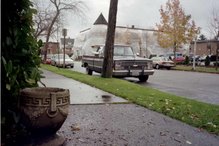I always knew my father was in the army. I knew because my father would tell stories
about his life.
The story of the MP was just one example, this was the story about the M.P.:
The story of the MP was just one example, this was the story about the M.P.:
I was so worried about my stomach the rest of the way
over that all I ate was some canned milk and a few of those little oyster
crackers. I didn't eat anything of any
substance so when we got over to Liverpool I was pretty weak. I did manage to carry my seventy-pound pack
and my duffle bag which probably weighed another sixty-five pounds up out of
the ship from C-Deck to B-Deck to A-Deck and over the gang plank down to the
dock.
And there I thought I'd take a bit of a rest. So I sat down and leaned up against a little
building there for a few minutes and one of the MP's on the dock came over and
said, “What's the idea? What are you
goofing off for, why are you falling out?”
Why I told him what had happened.
So he sez, “Well, wait a minute.”
When I got my breath he took ahold of one end of my
duffle bag and I got the other and we
hauled it over to what they call a goods wagon, that's sort of a freight
box or freight car on the English railway.
That's where all the rest of them were putting theirs. That's the last I saw of that till we got to
Everley Manor. But if anybody complains
about MP's to me, I always tell em, how, one of em was a friend of mine.
The story about the M.P. was that kind of
story: there are kinds of stories, one
kind was a testimony faithfully remembered, “…if anybody complains about MPs to
me, I always tell em, how, one of em was a friend of mine.”
There is the story, a kind of story, about when a person was
born. It was a nine-day stay at Tacoma General
Hospital. The doctor told her not to try
to have more children. It would probably
kill her, the doctor said. When the Runeberg met at the Valhalla Hall he went
over to announce that I was there, that I was a girl. He must have been at the hospital a lot of
the time.
They would tell me, the nurse when I was born was a
black woman. A Negro woman.
From next door above the house, as soon as we were
at home, my mother’s family probably walked next door to visit from having
Thanksgiving dinner. We took a taxi to
the hospital, my father probably said.
He would tell a story about Lake Whatcom, where he was born in a log
cabin, or a story about working his way through pharmacy school, or about the
army.
My mother would say she did not tell a lot of
stories the way my father did. She could
chime in, like a tapped tone on a xylophone, that my father told the taxi
driver all the way to look out for chuck holes on the road.
He would not talk about patients or about the
medical procedures. Those were
restricted information. He told only one or two stories about working at Northern
State Hospital. Again, he would not talk
about the psychiatric patients or about the medical procedures. These were restricted information. But he would tell one or two stories about
Northern State Hospital. This was how I
always knew my father was in the army.
And how I always knew my father had worked at Northern State Hospital.



No comments:
Post a Comment